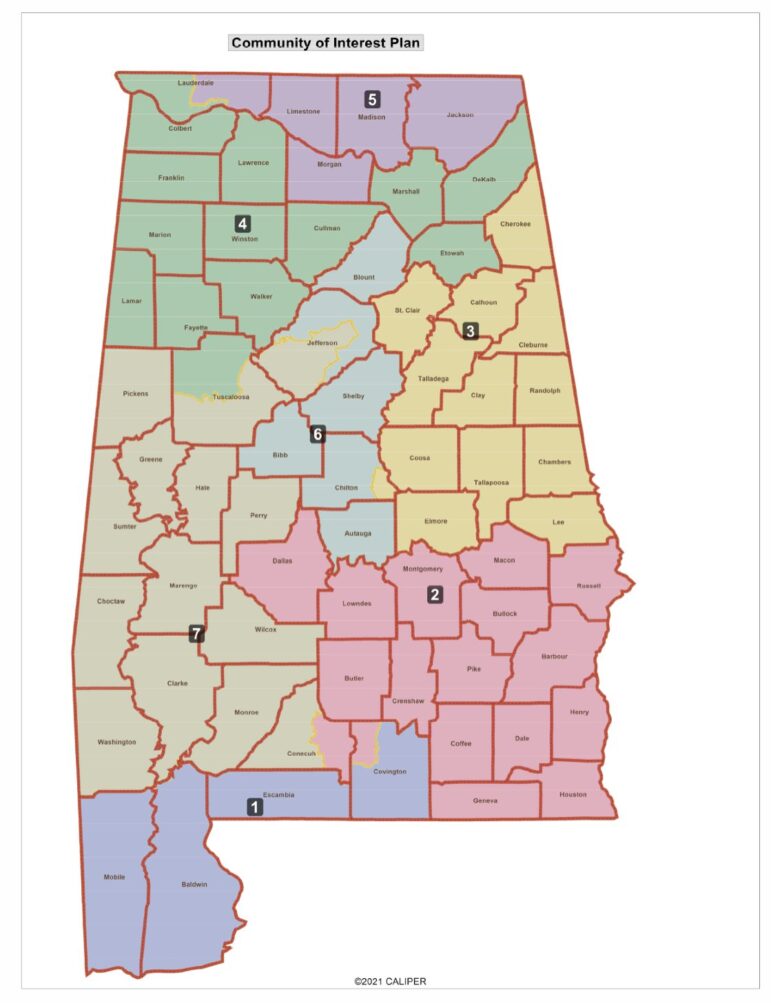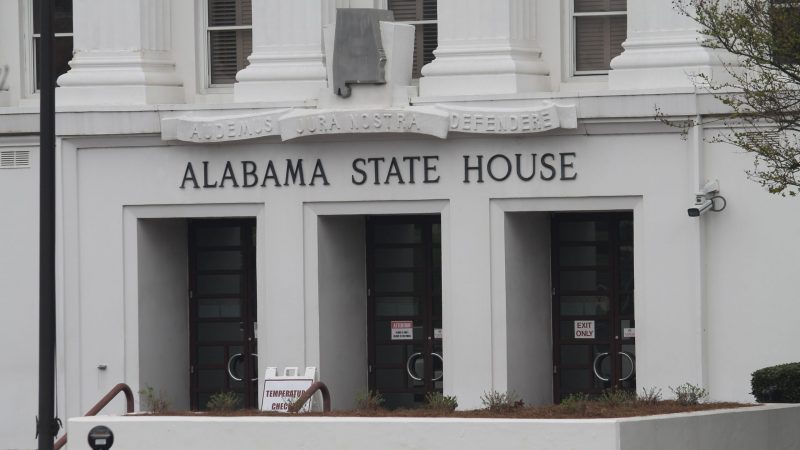Alabama Republicans, despite Supreme Court ruling, reject call for second majority Black district
MONTGOMERY, Ala. (AP) — Alabama Republicans, under orders of the U.S. Supreme Court to redraw congressional districts to give minority voters a greater voice in elections, rejected calls Monday to craft a second majority-Black district and proposed a map testing the judges’ directive.
Lawmakers must adopt a new map by Friday after the high court in June affirmed a three-judge panel’s ruling that Alabama’s existing congressional map — with a single Black district out of seven statewide — likely violated the Voting Rights Act.
In a state where more than one in four residents is Black, the lower court panel had ruled in 2022 that Alabama should have another majority-Black congressional district or something “close to it” so Black voters have the opportunity to “elect a representative of their choice.”
Republicans, long resistant to creating a second Democratic-leaning district, proposed a map that would increase the percentage of Black voters in the 2nd congressional district from about 30% to nearly 42.5%, wagering that would satisfy the court — or that the state will prevail in a second round of appeals.

House Speaker Pro Tempore Chris Pringle, who serves as co-chairman of the state redistricting committee, said the numbers are sufficient to provide an opportunity for an African American candidate to get elected. He said the plan satisfies the court’s instruction to give Black voters a greater opportunity to elect their preferred candidates.
“We took in consideration what the court asked us to do which was to provide an opportunity district that complied with Section 2 (of the Voting Rights Act,)” Pringle said.
The Permanent Legislative Committee on Reapportionment approved the proposal in a 14-6 vote that fell along party lines. The proposal will be introduced as legislation Monday afternoon as lawmakers convene a special session to adopt a new map by a Friday deadline set by the three-judge panel.
The National Redistricting Foundation, one of the groups that backed challenges to the Alabama map, called the proposal “shameful” and said it would be challenged
“It is clear that Alabama Republicans are not serious about doing their job and passing a compliant map, even in light of a landmark Supreme Court decision,” said Marina Jenkins, executive director of the National Redistricting Foundation.
She called that a pattern seen throughout the state’s history “where a predominately white and Republican legislature has never done the right thing on its own, but rather has had to be forced to do so by a court.”
Democrats accused Republicans of rushing the process and thwarting the court’s directive.
Sen. Vivian Davis Figures, a Democrat from Mobile, said the court was clear that the state should create a second majority-Black district or something close to it.
“Forty-two percent is not close to 50. In my opinion 48, 49 is close to 50,” Sen. Vivian Davis Figures, a Democrat from Mobile, said after the meeting. Figures had urged colleagues to adopt a proposal by the plaintiffs in the Supreme Court case that would make the 2nd district 50% Black.
Rep. Chris England, a Democrat from Tuscaloosa, said he also doesn’t think the GOP proposal would satisfy the court’s directive. He said Republican lawmakers pushed through there proposal without a public hearing or producing a voter analysis of how the district will perform and how if it is a red, blue or swing district. Pringle said that information will be available Tuesday.
“The map that we adopted, nobody had any input on. There was no public input on it, not subject to a public hearing and now it’s going to be the map of choice,” England said.
Deuel Ross, a lawyer with the NAACP Legal Defense and Educational Fund who argued the case before the Supreme Court, said lawmakers have yet to provide the information “necessary to evaluate whether these plans will in fact provide Black voters with opportunities to elect their candidates of choice in two districts.”
“Any plan with a low Black voting age population does not appear to comply with the Court’s instruction,” Ross wrote in an email.
Joe Reed, chairman of the Alabama Democratic Conference — the state’s oldest Black political organization —told urged lawmakers that the district will not elect a Black candidate to Congress unless it is a majority Black district.
Partisan politics underlies the looming redistricting fight. A higher percentage of Black voters increases the chances that a the seat will switch from GOP to Democratic control.
Pollster Zac McCrary said predicting a district’s partisan leanings depends on a number of metrics, but “getting a district too far below the mid 40s in terms of Black voter composition could certainly open the door for Republicans.”
Pentagon ends deployment of 2,000 National Guard troops in Los Angeles
The withdrawal accounts for nearly half of the soldiers sent to Los Angeles in June to suppress protests over the Trump administration's immigration crackdown.
Americans’ medical debt can stay in credit reports, judge rules. What does that mean?
The judge's decision vacated a rule imposed by the Biden administration earlier this year to keep medical debt from affecting credit scores.
Attorney General Bondi brushes aside questions about her handling of Epstein files
Pam Bondi sought to move past questions about her handling of the Justice Department's files from the Jeffrey Epstein investigation, as pressure continued to grow for her to release them.
Increase in military aid to Ukraine marks a shift in White House policy toward Russia
The Pentagon and U.S. military officials in Europe are working with NATO members to ship more Patriot missile systems to Ukraine and release more munitions that were briefly halted.
Texas flash flood recovery effort turns its focus to lakes
With 101 people still missing after the July 4 flash flood, the focus turns to local lakes, and what may be buried in them.
U.S. senator wants DOGE out of sensitive payment system for farmers
Sen. Tammy Baldwin, D-Wis., wants the USDA to revoke high-level access granted to the Department of Government Efficiency to a database that controls payments and loans to farmers and ranchers.







